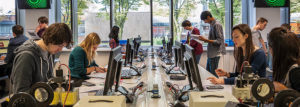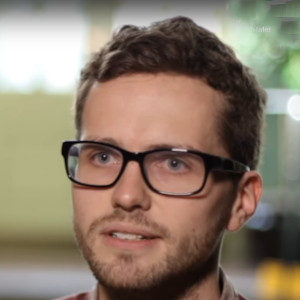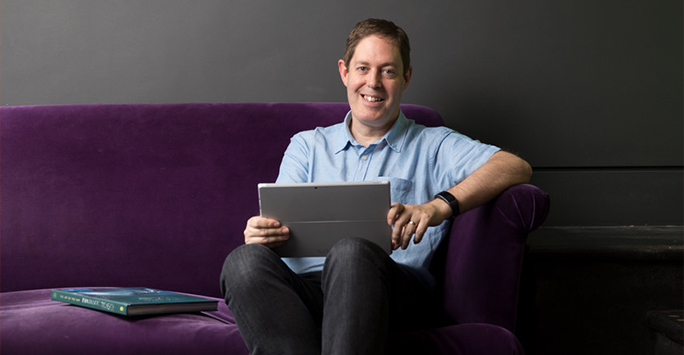Physics
UCAS code F300
- Study mode
- Full-time
- Duration
- 3 years
- Start date and application deadlines
-
- Start date
UCAS code F300
This programme will provide you with a range of transferable skills. Putting you at the forefront of modern physics working with academics on projects at CERN and international research centres.
Physics is the most fundamental of the sciences.
New concepts, such as quantum mechanics and relativity, are introduced at degree level in order to understand nature at the deepest level. These theories have profound philosophical implications because they challenge our view of the everyday world. At the same time they have a huge impact on society since they underpin the technological revolution.
While studying one of the most intellectually satisfying disciplines, you will acquire transferable skills including numeracy, problem solving and an ability to reason clearly and communicate well.
Physics degrees are highly prized in the flexible labour market of today and our graduates have excellent career opportunities in academic research, industrial research and development, teaching, computing, business and finance.
This course is accredited by the Institute of Physics.
This programme is accredited by the Institute of Physics, which means it satisfies the academic requirements for Chartered Physicist status. The Institute of Physics is the professional body for physics in the UK and Ireland.

We’re proud to announce we’ve been awarded a Gold rating for educational excellence.
Discover what you'll learn, what you'll study, and how you'll be taught and assessed.
The first year starts with a one-week project to familiarise you with the staff and other students. There will be two maths modules in each of the first two years; these are designed to provide the mathematical skills required by physics students.
| Optional modules | Credits |
|---|---|
| INTRODUCTION TO MEDICAL PHYSICS (PHYS115) | 7.5 |
| INTRODUCTION TO NUCLEAR SCIENCE (PHYS135) | 7.5 |
| INTRODUCTION TO ASTROPHYSICS (PHYS155) | 7.5 |
| INTRODUCTION TO GEOPHYSICS (PHYS175) | 7.5 |
Programme details and modules listed are illustrative only and subject to change.
In year two you will broaden your understanding of physics, with modules designed to ensure you have mastered the full range of physics concepts.
| Optional modules | Credits |
|---|---|
| ACCELERATORS AND RADIOISOTOPES IN MEDICINE (PHYS246) | 15 |
| MATHEMATICS FOR PHYSICISTS IV (PHYS208) | 15 |
| STELLAR PHYSICS (PHYS251) | 15 |
Programme details and modules listed are illustrative only and subject to change.
The third year comprises a mix of core modules and many optional modules in physics. You will undertake a research project with a member of staff.
Our research-led teaching ensures you are taught the latest advances in cutting-edge physics research. Lectures introduce and provide the details of the various areas of physics and related subjects. You will be working in tutorials and problem-solving workshops, which are another crucial element in the learning process, where you put your knowledge into practice. They help you to develop a working knowledge and understanding of physics. All of the lecturers also perform world class research and use this to enhance their teaching.
Most work takes place in small groups with a tutor or in a larger class where staff provide help as needed. Practical work is an integral part of the programmes, and ranges from training in basic laboratory skills in the first two years to a research project in the third or fourth year. You will undertake an extended project on a research topic with a member of staff who will mentor you. By the end of the degree you will be well prepared to tackle problems in any area and present yourself and your work both in writing and in person. In the first two years students take maths modules which provide the support all students need to understand the physics topics.
| Compulsory modules | Credits |
|---|---|
| QUANTUM AND ATOMIC PHYSICS II (PHYS361) | 15 |
| ELECTROMAGNETISM II (PHYS370) | 15 |
| STATISTICAL THERMODYNAMICS (PHYS393) | 7.5 |
| PRACTICAL PHYSICS III (PHYS306) | 15 |
| PROJECT (BSC) (PHYS379) | 30 |
Programme details and modules listed are illustrative only and subject to change.
Our research-led teaching ensures you are taught the latest advances in cutting-edge physics research. Lectures introduce and provide the details of the various areas of physics and related subjects. You will be working in tutorials and problem-solving workshops, which are another crucial element in the learning process, where you put your knowledge into practice. They help you to develop a working knowledge and understanding of physics. All of the lecturers also perform world class research and use this to enhance their teaching.
Most work takes place in small groups with a tutor or in a larger class where staff provide help as needed. Practical work is an integral part of the programmes, and ranges from training in basic laboratory skills in the first two years to a research project in the third or fourth year. You will undertake an extended project on a research topic with a member of staff who will mentor you. By the end of the degree you will be well prepared to tackle problems in any area and present yourself and your work both in writing and in person. In the first two years students take maths modules which provide the support all students need to understand the physics topics.
The main modes of assessment are coursework and examination. Depending on the modules taken you may encounter project work, presentations (individual or group), and specific tests or tasks focused on solidifying learning outcomes.
We have a distinctive approach to education, the Liverpool Curriculum Framework, which focuses on research-connected teaching, active learning, and authentic assessment to ensure our students graduate as digitally fluent and confident global citizens.
The Liverpool Curriculum framework sets out our distinctive approach to education. Our teaching staff support our students to develop academic knowledge, skills, and understanding alongside our graduate attributes:
Our curriculum is characterised by the three Liverpool Hallmarks:
All this is underpinned by our core value of inclusivity and commitment to providing a curriculum that is accessible to all students.
The qualifications and exam results you'll need to apply for this course.
| Qualification | Details |
|---|---|
| A levels |
BBC (including Mathematics: B and Physics: B) |
| BTEC Level 3 national extended diploma |
Not accepted for this programme. |
| BTEC combinations |
BTEC National Extended Certificate M plus BB including Mathematics grade B and Physics grade B at A level. |
| Welsh Baccalaureate Advanced |
C in the Welsh Baccalaureate, plus BB at A level to include Mathematics and Physics grade B. |
| Access |
Pass relevant Access to HE Diploma with 45 Level 3 credits with 27 at Distinction including 12 in Mathematics and 15 in Physics or 15 in Mathematics and 12 in Physics and 18 at Merit |
Studying with us means you can tailor your degree to suit you. Here's what is available on this course.
University of Liverpool students can choose from an exciting range of study placements at partner universities worldwide.
Immerse yourself in Chinese culture on an optional additional year at Xi'an Jiaotong Liverpool University in stunning Suzhou.
Broaden your world by spending an additional year of study at a partner university abroad following your second year of study.
Spend a summer abroad on a study placement or research project at one of our worldwide partner institutions.
Every student at The University of Liverpool can study a language as part of, or alongside their degree. You can choose:
This course is also available as a four year MPhys programme.
You will attend lectures, as well as working in tutorials and problem-solving workshops. Practical work is carried out in laboratories, starting with basic skills and progressing to a research project.
Your course will be delivered by the Department of Physics.






Find out a little bit more about Physics at Liverpool from Professor Carsten Welsch, Head of the Physics Department.
From arrival to alumni, we’re with you all the way:

Physics gives you a chance to explain how the world works, from the tiny, atomic scale to the large. I've enjoyed the practicals, getting to grips with handling the equipment and the scientific methods. I’ve developed a lot of skills that I will apply throughout my life.

Want to find out more about student life?
Chat with our student ambassadors and ask any questions you have.
Third year student, Cara, gives her views on what its like studying Physics at Liverpool.
A physics degree is a great starting point for a physics related career, engineering and computing careers.
Physicists are trained to solve a wide range of problems. That is why graduates have gone on to explore careers in such diverse areas such as:
88% of physics students find their main activity after graduation meaningful.
(Graduate Outcomes, 2018-19.)
Hear what graduates say about their career progression and life after university.

Dr Stuart Penn (BSc Hons Physics 1988, PhD 1992) has turned a love of science and sci-fi into a blockbuster movie career. Here he describes his journey from superconductors to special effects.
Your tuition fees, funding your studies, and other costs to consider.
Full-time place, per year - £9,535
Year abroad fee - £1,430 (applies to year in China)
Full-time place, per year - £29,100
Year abroad fee - £14,550 (applies to year in China)
The tuition fees shown are correct for 2025/26 entry. Please note that the year abroad fee also applies to the year in China.
Tuition fees cover the cost of your teaching and assessment, operating facilities such as libraries, IT equipment, and access to academic and personal support. Learn more about paying for your studies.
We understand that budgeting for your time at university is important, and we want to make sure you understand any course-related costs that are not covered by your tuition fee. This may include a laptop, books, or stationery. Additional costs for this course could include travel to placements.
Optional field class/school placements
These costs are covered by the Department of Physics for the optional field trip in year three.
Students are reimbursed for travel costs to school placements undertaken as part of an optional module in year three.
We offer a range of scholarships and bursaries that could help pay your tuition and living expenses.
If you’re a UK student joining an undergraduate degree and have a household income below £35,000, you could be eligible for a Liverpool Bursary worth up to £2,000 for each year of undergraduate study.
Apply for an Asylum Seekers Scholarship and you could have your tuition fees paid in full and receive help with study costs. You’ll need to have applied for asylum in the UK, or be the dependant of an asylum seeker, and be joining an eligible undergraduate degree.
If you’ve spent 13 or more weeks in Local Authority care since age 14, you could be eligible for a bursary of £3,000 per year of study. You’ll need to be a UK student joining an eligible undergraduate degree and be aged 28 or above on 1 September in the year you start.
Are you a UK student with a Black African or Caribbean heritage and a household income of £25,000 or less? You could be eligible to apply for a Cowrie Foundation Scholarship worth up to £8,000 for each year of undergraduate study.
If you’re a UK student identified as estranged by Student Finance England (or the equivalent UK funding body), you could be eligible for a bursary of £1,000 for each year of undergraduate study.
Joining a School of Biosciences degree and have a household income of less than £25,000? If you’re a UK student, you could apply to receive £4,500 per year for three years of your undergraduate course.
Do you live in the Liverpool City Region with a household income of £25,000 or less? Did neither of your parents attend University? You could be eligible to apply for a Nolan Scholarship worth £5,000 per year for three years of undergraduate study.
Are you a UK student with a household income of £25,000 or less? If you’ve participated in an eligible outreach programme, you could be eligible to apply for a Rigby Enterprise Award worth £5,000 per year for three years of your undergraduate degree.
Are you a UK student with a household income of £25,000 or less? Did neither of your parents attend University? You could be eligible to apply for a ROLABOTIC Scholarship worth £4,500 for each year of your undergraduate degree.
Apply to receive tailored training support to enhance your sporting performance. Our athlete support package includes a range of benefits, from bespoke strength and conditioning training to physiotherapy sessions and one-to-one nutritional advice.
Joining a degree in the School of Electrical Engineering, Electronics and Computer Science? If you’re a UK student with household income below £25,000, you could be eligible to apply for £5,000 a year for three years of study. Two awards will be available per academic year.
If you’re a young adult and a registered carer in the UK, you might be eligible for a £1,000 bursary for each year of study. You’ll need to be aged 18-25 on 1 September in the year you start your undergraduate degree.
Use our handy chatbot for your Clearing enquiries.
Last updated 17 June 2025 / / Programme terms and conditions